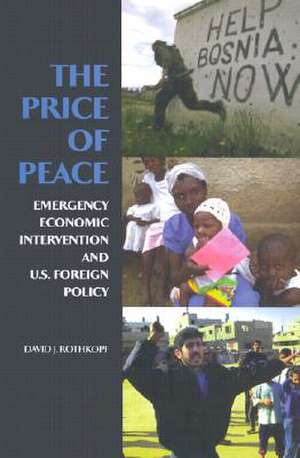The Price of Peace: Emergency Economic Intervention and U.S. Foreign Policy
Autor David J. Rothkopfen Limba Engleză Paperback – mai 1998
In Bosnia, the Middle East, Haiti, and other situations central to the U.S. post-Cold War foreign policy, success or failure has turned on America's ability to promote hope and opportunity as the by-products of intervention. In the wake of war, violence, and civil unrest, providing jobs, homes, basic services, and capital has been the strategy for subduing opposition and building political will as U.S. and allied troops wind down their limited missions. At the same time, dwindling aid budgets, differences with other donors, institutional gaps, congressional opposition, and conflicting objectives have compromised the effectiveness of economic recovery programs worldwide. This book is built around a detailed analysis of U.S. efforts in Bosnia-Herzegovina, in the Palestinian Territories, and in the Republic of Haiti. It assesses the effectiveness of U.S. strategic planning and the implementation of American economic plans in each of these situations, identifying areas where new approaches and programs may be needed to enhance the likelihood of success in the future. With the resolution of regional conflicts looming as an increasingly important component of U.S. foreign policy and the concurrent unwillingness to expose U.S. forces to prolonged risk in these situations, post-conflict initiatives will prove to be more important than ever before. This book offers crucial insights into the challenges of promoting stability through the restoration of hope and opportunity to the victims of crises and provides a forward-looking assessment of the future demands and opportunities created in conjunction with the economic dimensions of peacekeeping.
Preț: 61.03 lei
Nou
Puncte Express: 92
Preț estimativ în valută:
11.68€ • 12.15$ • 9.79£
11.68€ • 12.15$ • 9.79£
Carte disponibilă
Livrare economică 20 februarie-06 martie
Preluare comenzi: 021 569.72.76
Specificații
ISBN-13: 9780870031502
ISBN-10: 0870031503
Pagini: 102
Dimensiuni: 152 x 229 x 8 mm
Greutate: 0.2 kg
Ediția:New.
Editura: Brookings Institution Press
Colecția Carnegie Endowment for Int'l Peace
ISBN-10: 0870031503
Pagini: 102
Dimensiuni: 152 x 229 x 8 mm
Greutate: 0.2 kg
Ediția:New.
Editura: Brookings Institution Press
Colecția Carnegie Endowment for Int'l Peace
Notă biografică
David J. Rothkopf is managing director of Kissinger Associates, Inc. He is a nonresident associate at the Carnegie Endowment and an adjunct professor of international affairs at Columbia University. From 1993 to 1996, he held posts in the Clinton Administration, and served as Acting Under Secretary of Commerce for International Trade.
Descriere
In Bosnia, the Middle East, Haiti, and other situations central to the U.S. post-Cold War foreign policy, success or failure has turned on America's ability to promote hope and opportunity as the by-products of intervention. In the wake of war, violence, and civil unrest, providing jobs, homes, basic services, and capital has been the strategy for subduing opposition and building political will as U.S. and allied troops wind down their limited missions. At the same time, dwindling aid budgets, differences with other donors, institutional gaps, congressional opposition, and conflicting objectives have compromised the effectiveness of economic recovery programs worldwide. This book is built around a detailed analysis of U.S. efforts in Bosnia-Herzegovina, in the Palestinian Territories, and in the Republic of Haiti. It assesses the effectiveness of U.S. strategic planning and the implementation of American economic plans in each of these situations, identifying areas where new approaches and programs may be needed to enhance the likelihood of success in the future. With the resolution of regional conflicts looming as an increasingly important component of U.S. foreign policy and the concurrent unwillingness to expose U.S. forces to prolonged risk in these situations, post-conflict initiatives will prove to be more important than ever before. This book offers crucial insights into the challenges of promoting stability through the restoration of hope and opportunity to the victims of crises and provides a forward-looking assessment of the future demands and opportunities created in conjunction with the economic dimensions of peacekeeping.














